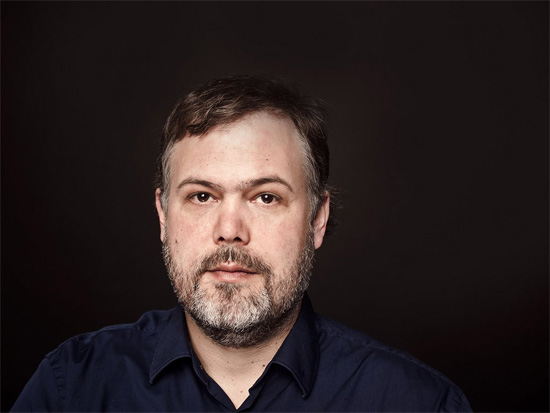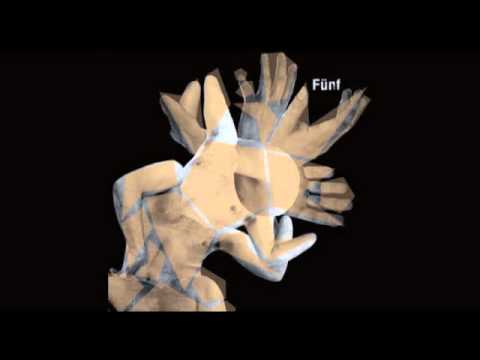Producer, DJ and label manager Nick Höppner is adept at keeping a low profile, so it seems right to give him a full introduction. Höppner has been a resident DJ of Berghain/Panoramabar – the hedonistic European capital of techno – since the early part of this century, right back when the old Ostgut club was still in existence. He now manages Berghain/Panoramabar’s respected in-house label, Ostgut Ton, A&Ring the likes of Shed, Marcel Dettmann, Ben Klock, P.A.S and Steffi.
The latest ambassador for Berghain/Panoramabar is Höppner’s latest release, Panoramabar 04, the newest instalment in a mix CD series that’s already seen gems from residents like Cassy and Tama Sumo. His follows in the same vein, a mix full of exclusive new tracks and vast techno landscapes, some of which the club’s regulars will doubtless recognise from Höppner’s renowned sets. His own approach to DJing is renowned for its variety, shifting fluidly between genres and geographical locations – something that’s further explored in his own productions, which explore rhythms and moods far beyond the nocturnal 4/4 pulse typically associated with Ostgut Ton.
Panoramabar 04’s release comes in the middle of a pivotal debate around the future of Berlin’s nightlife. GEMA, the powerful German collections agency, is proposing to implement a new tariff structure which will mean a dramatic increase in music royalty charges. The city’s clubs claim that they face obliteration if these fees come into force. What price the vitality and creativity of the Berlin music scene? When asked, Höppner accepts that the proposed changes pose a severe threat to the city’s club culture, but he’s cautiously optimistic: in his gravelly tones, he suggests that GEMA is playing poker, Berghain must and will go on, and techno and house will continue to be a life force in the city.
Let’s start with the building blocks: how did you choose the material for Panoramabar 04? What was the process?
Nick Höppner: We’re always trying to include unreleased and exclusive material, so that’s one of the building blocks – the tracks by Jon McMillian, Dexter, Matthew Styles and The Mole. And I wanted it to reflect Panoramabar, in a way, through my years and eyes.
I get the sense that this mix contains only a tiny amount of what could have gone onto it. Is this correct?
NH: You’re completely restricted to the CD form. A CD can fit eighty minutes and that’s it. But I think we will see a renovation in the DJ mix concept in the future. Pretty soon DJs will be releasing longer form digitally because technically it’s possible, and the CD media format as the carrier of data is dying out very fast at the moment. If I ever get the chance to do a commercial mix again, it will be much longer and in a different format.
Do you think logistical challenges facilitate creativity?
NH: Of course. Anything that helps you make decisions is very important in any kind of creative process, because in the end you don’t create anything at all when you don’t make decisions, and restrictions kind of force you to make the decision. Eighty minute restrictions definitely help. The more media I have the less focus I have, as there are more options. This goes for DJing too. I am a vinyl DJ, so I only have one or two bags depending where I’m travelling. My bag holds eighty records. Each record has two or three tracks so I have a maximum of two hundred tracks with me. There’s kind of a filtering process or effect in place already, just because I choose to play with vinyl rather than being a laptop DJ with a hard drive.
There’s a real cross section between house and techno in this mix – is there also a uniting theme?
NH: I think a lot of the tracks have a certain feeling of understatement and a certain sense of deepness, and they are all very groovy and spaced. I think those are some of the connecting factors.
I felt it was very expansive, that there was a very wide landscape of sound.
NH: I’m happy you’re saying that because it’s one of my goals as a DJ to cover a really wide spectrum of club music. It’s always based on the 4/4 kick drum but that’s a carrier for so many different ideas and feelings. The whole thing is an embarrassment of riches, would you say? I really wouldn’t want to restrict myself to just one genre. I tend to enjoy DJs who go from A to Z a lot more than someone who only goes to A to B. I think it’s important to cover a lot of different styles, and it also helps you to surprise sometimes.
What is your own selecting process as a DJ?
NH: I think it is quite associative. For example, the way I am combining stuff is sometimes not by genre – there’s a certain element that I can hear in two tracks, the first one might be techno, the second might be house, but they are linked by a certain sound or a certain groove or something. My selection process filters in this way, not according to genre signifiers.
What do you think of GEMA row going on in Berlin at the moment?
NH: That’s a big problem now. There is quite a huge opposition to this, and there has been a demonstration last week with 5000 people in Berlin. I think it’s a really serious threat to nightlife in Berlin in general, because the reformation of the tariff system is completely blown out of proportion. And the problem is not just the ridiculous fees they’re asking, but the unfair distribution of the money.
But the last word hasn’t been spoken. There are a lot of economic factors to consider. The lobbyists tried to put pressure on GEMA to reconsider, and there are thoughts that GEMA came up with the ridiculous reformation plan just to realise a much lower reformation, which is still a lot higher, but it’s like they’re playing poker, and suggesting something really ridiculous to produce a good result. There will be a reformation, clubs will have to pay a lot more, but in the end it will be reasonable.
I think there is something positive to come of it. GEMA is like an old taxlord. Their structure is not contemporary at all, they slipped under the digital revolution, they are only catering for mainstream artists. This whole process may instigate a reformation of GEMA, so that things are really transparent, and people’s music will be played accordingly and transparently. I hope so.
This won’t result in the levelling of the German club scene as we know it then?
NH: This would be too much of a price. Berlin is full of nightclubs. And there have been so many spinoffs. In and around Berlin there are so many electronic music festivals. It’s a proper industry. Hundreds and thousands of people depend upon it – doorstaff, bar staff, DJs, the ones who are cleaning the buildings, it’s huge. It’s too huge to risk it. And also it’s attracting tens of hundreds of tourists every year.
In this changing landscape, where does Panoramabar 04 fit in and how does it work as a vehicle with a message?
NH: It is a recommendation on many levels for the DJ, for the club, and for all the artists included on the mix. To a certain extent it conveys a little bit – just a tiny bit – of that experience. Of course you can’t conserve Panoramabar on a mix CD, but it’s a tiny little thing that you can take hold of and use as a souvenir.
In an interview with Scuba recently, he told me that the best music was always simple. Do you agree?
NH: I think that it can be true. I’m not sure I can agree generally, but when we talk about techno and house I think it’s totally true. It’s a very simple and true minimal concept that is behind techno and house, and this concept has been in effect for 25 years now – or even longer, if you count disco. I think when you listen to my mix CD, nothing on it is overly complicated or overproduced or has super clever arrangements. I think it is all pretty simple, and that is the main attraction of techno and house, because it is a music that is very much about the moment, not about the future or the past. If you have really simple tracks you can sort of live in them – it sounds a bit stupid – but you can say, now I’m only focusing on the kick drum, now I’m listening closely to the hi hat, now I’m concentrating on the space between all the elements. There are some tracks where there are just four elements – so I think it’s totally true for techno and house, but music in general can be complicated and good at the same time.
Can simple music contain a political dimension?
NH: I think the political dimension comes from the context surrounding it. The music itself may be messageless, but it is the surroundings and social setting of the club, how people are interacting with each other, why they play this, why they don’t play that, that’s all that can be considered political.
How far has Berghain come in the last 10 years?
NH: Very far. I moved to Berlin in 2001, and although the nineties were quite a crazy decade in terms of techno already, the Loveparade being the most visible phenomenon, I think internationally it only started at the beginning of the 2000s. When I arrived it was a very local thing, not national: people from Munich wouldn’t come to Berlin to go clubbing. When I arrived I was riding the crest of the wave. I thought it would implode, but the opposite happened. This is down to the often-told story of the living conditions – the cost of living is cheap. There’s lots of space, and a very liberal atmosphere. Things will carry on and change at the same time and I don’t see why Berghain or the Berlin nightlife should stop existing any time soon unless GEMA comes through or kerosene becomes ridiculously expensive. I think those are the only two problems which would put a stop to this.
Panoramabar 04 is out now via Ostgut Ton



